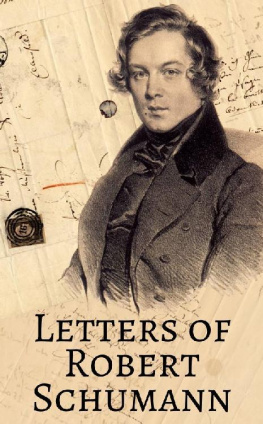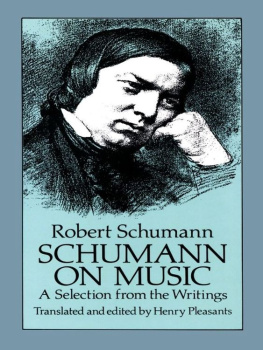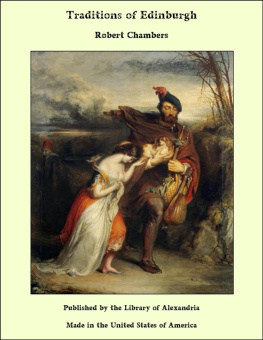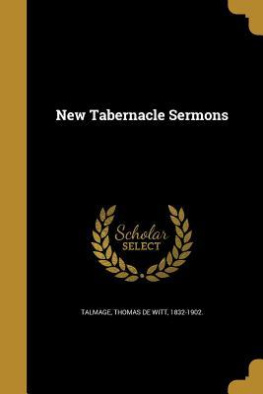Letters of Robert Schumann
Preface
There are many to proclaim
Klopstocks fame;
There are fewer who could quote
What he wrote.
Such grandeurs little gain
To attain;
For myself I choose instead
To be read.
If Lessings pessimistic epigram is justified with regard to poetry, it may with equal truth be applied to the indifference commonly displayed towards the letters of eminent persons, and particularly towards musicians letters, which so seldom possess a purely literary interest. It was my conviction of this which led me to bring out the present selection of Schumanns letters, and the earlier volumes on Beethoven and Mozart. A mans letters undoubtedly form one of the best clues to his character; but while the student will welcome almost any number of these documents in the hope of gaining insight into the writers mind, there must be many music-lovers who have neither time nor opportunity for such researches, and it is for them, primarily, that this volume has been compiled.
There was little difficulty in making an attractive selection in Schumanns case, for his letters have a considerable literary value. I have, further, so arranged them as to form something of a biography, with the idea of providing a picture of Schumanns inner development, as well as of his outward career. To this picture the introductory chapters provide a frame, and some explanatory notes have been added.
For this book I have drawn on the following sources:
Jugendbriefe von Robot Schumann, from originals provided by Clara Schumann (third edition. Leipzig, 1898).
Robert Schumanns Briefe, new series, edited by F. G. Jansen (second enlarged edition. Leipzig, 1904).
Jansen, Die Davidsbndler (Leipzig, 1888).
B. Litzmann, Clara Schumann (vols. i. and ii. Leipzig, 1903-1905).
Biographical Note
Robert Alexander, the youngest of the five children of Friedrich August Gottlob and Johanne Christiane Schumann, was born on June 8, 1810, at Zwickau, in Saxony. His father was a bookseller and something of an author. He took a keen interest in all literary and artistic matters, and encouraged similar tastes in his son. A great event in Roberts early life was a visit to Carlsbad, where he heard Moscheles. He was only nine years old, but the impression he received was so strong that he never lost the feeling of respect with which the great pianist inspired him. The only musical instruction he received at Zwickau was from Kuntzsch, the organist, who gave him pianoforte lessons for some years, and eventually announced that his pupil, for whom he prophesied a brilliant future, might safely dispense with tuition. Schumanns studies for pedal pianoforte, Op. 56, are dedicated to his old master. When he was fourteen he wrote some of the musical biographies in a work compiled by his fathera picture-gallery of famous men of every age and race. In 1826 his father died. Two years later Schumann left his quiet life at Zwickau, and went up to the University of Leipzig to study law, by his mothers wish. But he did not settle at Leipzig, and at Easter, 1829, removed to Heidelberg, attracted by the brilliant jurists attached to Heidelberg University, and also by the romantic associations of the place. His intention was to return to Leipzig after two years, and take his degree there; but although jurisprudence was presented in a more attractive light by Thibaut at Heidelberg, Schumann devoted more attention to philosophy and music than to his professional studies. He made little effort to master his antipathy to law, which he did not openly abandon, however, until the autumn of 1880, when he at length decided to adopt music as his profession. His mother considered music too precarious as a means of livelihood, and was only induced to consent to the change of plan when Schumann secured the support of Thibaut and Wieck. His acquaintance with Wieck (afterwards his father-in-law) dated from 1828, and he returned to Leipzig in October, 1830, to study pianoforte under him. But Wieck no longer taught him on the same methodical lines as during his earlier stay at Leipzig, and in the following autumn Schumann became anxious to change. He wrote to Hummel to offer himself as a pupil, but this plan was not carried out, and in 1832 he lamed the middle finger of his right hand permanently. He was therefore driven to turn his attention to composition and literary work. The winter of 1832-1833 was spent with his family at Zwickau and Schneeberg. Returning to Leipzig in the spring, he conceived the idea of starting, together with Wieck and others, a weekly musical paper (Neue Zeitschrift fr Musik). The first number appeared on April 3, 1831, and was edited conjointly by Ludwig Schunke, Wieck, Julius Knorr, and Schumann. From 1835 to 1814 Schumann was sole editor. He was himself a large contributor, and mystified his public by an imaginary society, the Davidsbund. The original members of the Davidsbund were two, Florestan and Eusebius, fictitious personages evolved from Walt and Vult in Jean Paul Richters Flegeljahre, who represented differing aspects of Schumanns own personality. Florestan stood for the masculine, energetic side of his temperament; Eusebius for its feminine, introspective tendencies. A third personage, Raro, represented a union of these two. Schumanns criticisms in the paper often took the form of imaginary conversations in which Florestan and Eusebius maintained opposite sides of the argument, Raros judgment being invariably accepted as final. The further development of the Davidsbund, in which he incorporated many of his friends, is traced in Part III. of this book.
Schumanns attachment to Ernestine von Fricken, a pupil of Wiecks, led to an engagement; but he soon realized that he had mistaken his own feelings, and it was broken off in January, 1830, by mutual consent. He had set his heart on marrying Wiecks daughter, Clara, the brilliant girl pianist, but Wieck persistently opposed a match which did not satisfy his ambitions for his daughter. Schumann spent the winter of 1838-1839 in Vienna, where he hoped to establish himself with Clara, but he was unable to cope with the intrigues which surrounded him on all sides, and returned to Leipzig in the spring of 1839. On February 24, 1840, he received the honorary degree of Dr. Phil, from the University of Jena. In despair of obtaining Wiecks consent to their marriage, the lovers were finally driven to appeal to a court of law for permission, and were married at Schnefeld, a village near Leipzig, on September 12, 1840. A statement of the difficulties they had encountered is given by Schumann in a letter (No. 90) to the lawyer entrusted with the case.
In the spring of 1844 Schumann accompanied his wife to Russia on a concert tour. In October of the same year they left Leipzig, and by the doctors advice went to live in Dresden. Schumann had been suffering from nervous depression, and it was hoped that he would gain some rest from music at Dresden, which was comparatively unimportant as a musical centre, In 1850 he accepted the post of conductor at Dsseldorf. This step seems to have been a fatal mistake. Schumann entirely failed as a conductor; his temperament was peculiarly unsuited to a public position of this sort, and the strain probably aggravated the mental disorder of which he had shown signs even before his marriage. After the opening concert of the winter season in 1853 an attempt was made to lead him to resign, and from that time onwards both rehearsals and concerts were conducted by Tausch. An invitation to Schumann and his wife to give a number of concerts in Holland relieved them from the embarrassment of staying in Dsseldorf, and they started on their tour in November, returning to Dsseldorf for Christmas. But Schumanns melancholy soon set in again, and in February, 1854, he attempted to take his life by throwing himself into the Rhine. He was removed to an asylum at Endenich, near Bonn, where he remained until his death on July 29, 1856.





